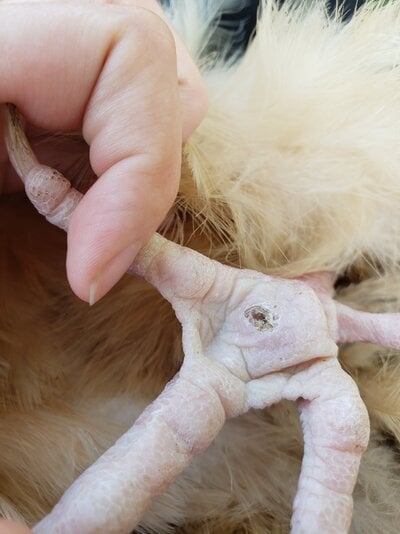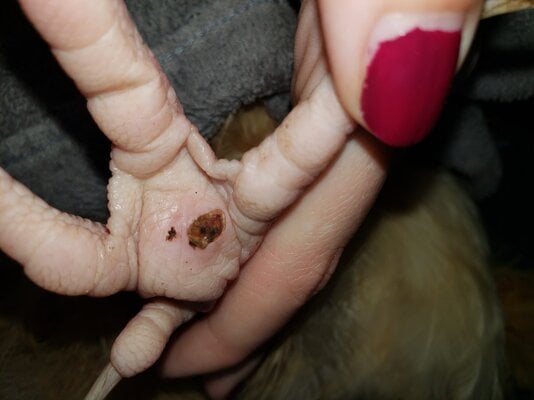I've seen a few times on threads where people will advise to leave early bumblefoot alone. Having dealt with bumblefoot myself twice but am obviously not super experienced, I am confused me as to why you would leave it alone. Here's my personal reasoning:
Bumblefoot is a bacterial infection that can be comprised of E. Coli, Pseudomonas, and, most notably, Staphylococcus. As far as I know, these can be pretty nasty bacteria that when left untreated, can get a lot worse. I've seen people suggest that if there's no reddening or swelling, to not do anything. But why would you wait for that to happen? The longer you wait, the harder it will be for the infection to be eradicated, especially since most people treat at home. I'm sure sometimes it will simply go away- in fact I've seen people say it happened with their chickens and their experiences are valid- but based on my personal experience I'd be afraid of waiting to find out.
I had a hen who had very early bumblefoot. No reddening, no swelling, nothing but the little scab that didn't seem that deep or very fully formed. It really didn't seem that concerning at all.

I did not treat it for a few days while I awaited some topical antibiotics to come in the mail (I was dealing with another chicken with more severe bumblefoot so I figured I'd get some stronger stuff). In just 3 days, it had progressed to this. Now, that's still not bad at all and was easy to treat, but how fast it got worse is something to be noted.

I tried to get away with treating it non-invasively to save her some unnecessary pain since it was so mild, but realized I wasn't making very good progress and ended up removing the scab. At this point, taking the scab off and treating it was causing more pain and stress than leaving it alone. However, if I did nothing, she probably would be in more pain and stress from the infection getting worse down the road, and it would be more painful to treat. Her bumblefoot is gone, has stayed gone so far, and she is happily bounding in the yard. The other hen I mentioned, her bumblefoot was a lot worse. It got so bad because I didn't do anything for a good while (long story short, she had feet problems that made her bumblefoot a bit hard to recognize, especially since this was my first case). Due to me waiting, her infection got too bad and after trying my hardest to treat her for months with what I had and no vet care, I could not keep the infection away and decided to put her out of her misery.
I'm sure people who have advised to leave bumblefoot alone will read this, and I want to say that I'm not trying to call you out or tell you you're wrong or anything like that. I guess I just want to start a conversation. I'm definitely not an expert on bumblefoot having only treated it twice. I want to learn more about this, especially since this advice seems to be a lot different than what's commonly suggested. If I can get away with not having to treat bumblefoot in the future I'm all for it! But infections are no joke and I don't want to take any risks.
Thank you for any experiences and/or info!
Bumblefoot is a bacterial infection that can be comprised of E. Coli, Pseudomonas, and, most notably, Staphylococcus. As far as I know, these can be pretty nasty bacteria that when left untreated, can get a lot worse. I've seen people suggest that if there's no reddening or swelling, to not do anything. But why would you wait for that to happen? The longer you wait, the harder it will be for the infection to be eradicated, especially since most people treat at home. I'm sure sometimes it will simply go away- in fact I've seen people say it happened with their chickens and their experiences are valid- but based on my personal experience I'd be afraid of waiting to find out.
I had a hen who had very early bumblefoot. No reddening, no swelling, nothing but the little scab that didn't seem that deep or very fully formed. It really didn't seem that concerning at all.

I did not treat it for a few days while I awaited some topical antibiotics to come in the mail (I was dealing with another chicken with more severe bumblefoot so I figured I'd get some stronger stuff). In just 3 days, it had progressed to this. Now, that's still not bad at all and was easy to treat, but how fast it got worse is something to be noted.

I tried to get away with treating it non-invasively to save her some unnecessary pain since it was so mild, but realized I wasn't making very good progress and ended up removing the scab. At this point, taking the scab off and treating it was causing more pain and stress than leaving it alone. However, if I did nothing, she probably would be in more pain and stress from the infection getting worse down the road, and it would be more painful to treat. Her bumblefoot is gone, has stayed gone so far, and she is happily bounding in the yard. The other hen I mentioned, her bumblefoot was a lot worse. It got so bad because I didn't do anything for a good while (long story short, she had feet problems that made her bumblefoot a bit hard to recognize, especially since this was my first case). Due to me waiting, her infection got too bad and after trying my hardest to treat her for months with what I had and no vet care, I could not keep the infection away and decided to put her out of her misery.
I'm sure people who have advised to leave bumblefoot alone will read this, and I want to say that I'm not trying to call you out or tell you you're wrong or anything like that. I guess I just want to start a conversation. I'm definitely not an expert on bumblefoot having only treated it twice. I want to learn more about this, especially since this advice seems to be a lot different than what's commonly suggested. If I can get away with not having to treat bumblefoot in the future I'm all for it! But infections are no joke and I don't want to take any risks.
Thank you for any experiences and/or info!





